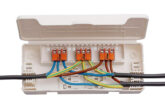
Matthew Holliday, the National Security Inspectorate’s Director of Approval Schemes, describes the business opportunities offered through security systems installation and how electricians can further professionalise their service through third-party certification.
The UK’s electronic security systems sector represents an attractive commercial proposition for professional electricians and installers seeking to expand their commercial scope and win fresh business. Market analysts value this sector in the billions, with good future growth forecast as our domestic economy recovers from the pandemic.
It is a well-established market: notable factors include the growth of CCTV cameras in Britain in the mid-’80s, followed by significant government grants which fuelled the national expansion of public-space monitoring during the 1990s. This drive continues today with wider public sector investment in both security and safety to improve public safety across the country.
Practical moves
Breaking into the security market, whether it be residential, commercial or public sector-related business, is best achieved as an independently approved electrical installer. It is a sector that is becoming increasingly regulated through Police operational requirements, government legislation and insurance. Buyers and specifiers are, in turn, ever more aware of the need to commission professionally approved and demonstrably competent system providers. The result is a growing emphasis on the value and reassurance to buyers offered by installers who can readily demonstrate their technical skills, training and operational awareness of the requirements which must be met.
For example, to qualify for Police response, ‘Type A’ intruder alarm systems monitored by an alarm receiving centre (ARC) or remote video response centre must meet recognised industry standards accepted by the National Police Chiefs’ Council (NPCC) in England, Wales and Northern Ireland and similar policy requirements from Police Scotland.
The NPCC’s Security Systems requirements detail how compliant systems should be installed, monitored and maintained. They also require security companies providing this service to be approved by a UKAS-accredited Certification Body such as NSI and registered with a local police force. Once conditions are fulfilled an application can be made to the Police for the system to be issued with a Unique Reference Number (URN). This means that if/when the alarm is activated the ARC will verify the alarm using prescribed confirmation methods before passing on a confirmed alarm to the Police, who will duly recognise the system’s URN and respond to the call.
If a security system is not compliant there will not be an immediate police response, which could prove vital if someone is in danger or property is being stolen. Insurance-related implications exacerbate the risks, potentially exposing businesses to further losses from withdrawal of cover. The prevalence of social media also represents a business continuity threat, with the potential for bad news of this type to adversely affect customer confidence.
Approval benefits
Independent, third-party certification represents a highly respected and trusted hallmark for service providers, quickly demonstrating their technical expertise and a reassuring quality of service. Buyers choosing an approved company have confidence from knowing their chosen provider is subject to ongoing verification of compliance through an impartial audit programme demonstrating their openness to independent scrutiny, their professionalism and trustworthiness.
Importantly, in NSI’s case, this reassurance extends to the issuing of a Certificate of Compliance as evidence that the system(s) installed at any customer’s premises fully complies with relevant standards, reinforcing the reliability of the approved provider. This includes both British, European and any applicable international standards, along with operational procedures and associated Codes of Practice. Other certification reassurances to buyers include the provision of ongoing appropriate training for their operational staff, ensuring the required level of skill. Third-party approval also, independently, shows that the installer is competent in terms of site-specific risk assessment procedures and implementation of appropriate protective measures.
Gold and Silver approval
NSI offers two levels of hallmark approval: NSI Silver indicates the attainment of industry’s highest technical standards listed on the installation Certificate of Approval, while NACOSS Gold companies show that in addition to adhering to the industry’s highest technical standards they maintain a commitment to continual improvement, performance, efficiency and customer service through an ISO 9001 Quality Management System (QMS).
NSI NACOSS Gold approved companies combine NSI’s Quality Schedule into their QMS, which is closely aligned with security industry standards, requiring them to undergo an additional level of rigour with NSI auditors during annual inspections.
NSI’s Systems Silver scheme is designed as a stepping stone towards NACOSS Gold and may be initially more appropriate to a sole trader rather than a larger electrical contractor, for example.
Conclusion
Buyers of high quality security systems will increasingly require the services of demonstrably competent, skilled and trained technicians to comply with operational requirements. Professional electricians are best placed to capitalise on this rising demand and differentiate their service offering through third-party certification from NSI or a similar body.
To watch a promotional video about the NSI and its services click here









